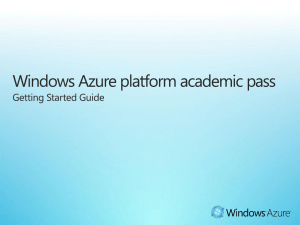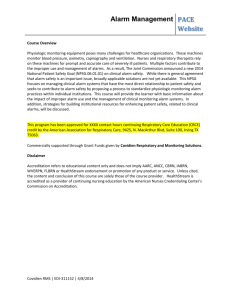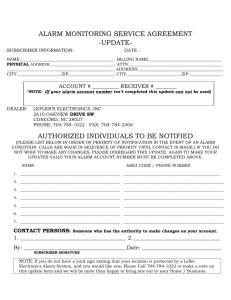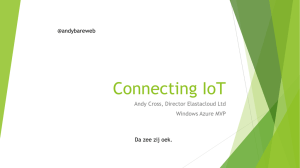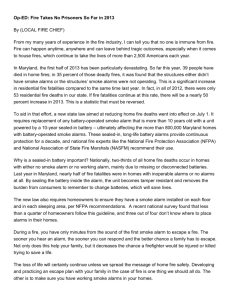Minutes of Service User Interest Group 7th December 2009 Present
advertisement
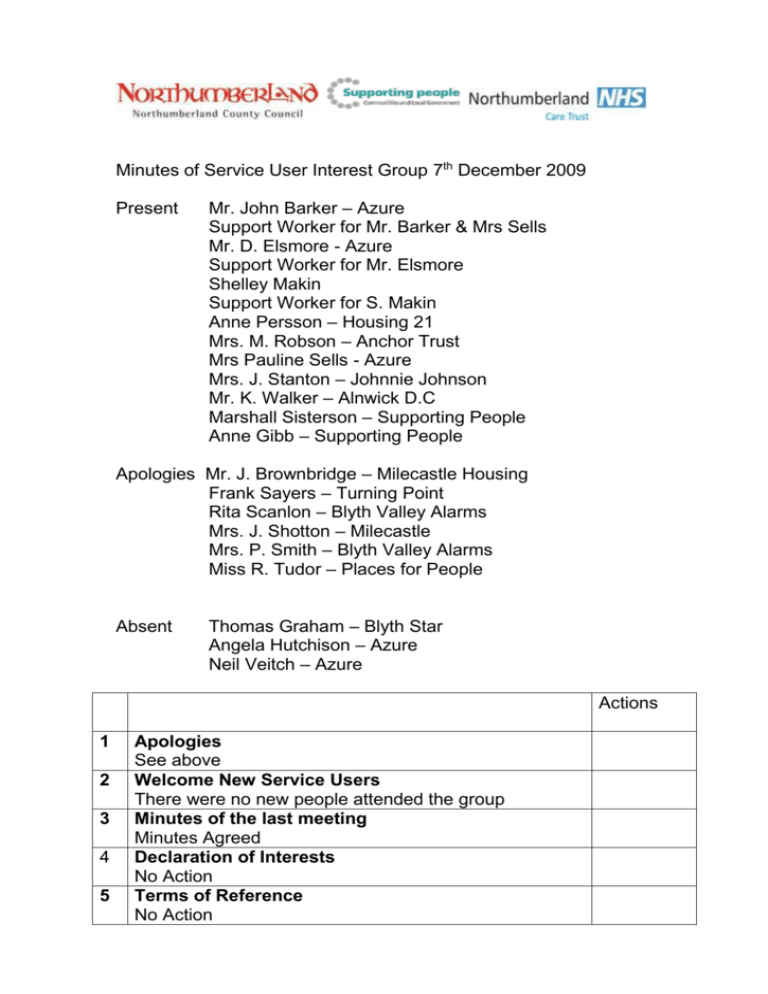
Minutes of Service User Interest Group 7th December 2009 Present Mr. John Barker – Azure Support Worker for Mr. Barker & Mrs Sells Mr. D. Elsmore - Azure Support Worker for Mr. Elsmore Shelley Makin Support Worker for S. Makin Anne Persson – Housing 21 Mrs. M. Robson – Anchor Trust Mrs Pauline Sells - Azure Mrs. J. Stanton – Johnnie Johnson Mr. K. Walker – Alnwick D.C Marshall Sisterson – Supporting People Anne Gibb – Supporting People Apologies Mr. J. Brownbridge – Milecastle Housing Frank Sayers – Turning Point Rita Scanlon – Blyth Valley Alarms Mrs. J. Shotton – Milecastle Mrs. P. Smith – Blyth Valley Alarms Miss R. Tudor – Places for People Absent Thomas Graham – Blyth Star Angela Hutchison – Azure Neil Veitch – Azure Actions 1 2 3 4 5 Apologies See above Welcome New Service Users There were no new people attended the group Minutes of the last meeting Minutes Agreed Declaration of Interests No Action Terms of Reference No Action 6 a 7 8 Consultation Items Kite Mark – Joanne Brett Joanne Brett is the Quality Improvement Manager who came to discuss the kite mark. This would show that any documentation was accessible and easy to read and that it had a “stamp of approval”. She suggested that this should be trialled first through Supporting People and then possibly across the whole of the Care Trust. In order to do this, there needs to be a decision made as to what should be looked at to ensure that a document is “easy read”. Some of the suggestions were whether the document itself was easily understood, that words used were easy to understand, that it was set out in a format that made reading easy, and that it should have no initials in the wording. In order to do this, it was suggested that a meeting be arranged for service users to look at and develop a criteria for easy read documents. AG confirmed that as well as the Service User Interest Group and the Editorial Group, there were also service users who had expressed an interest in reading documents and their names and addresses were available. KW said that in the past a crystal symbol had been used. JB informed the group that this is a big monitory investment and as we have service users who are happy to review documents, then this action would seem more appropriate. Kite marks were shown to the group and this will be discussed further at the meeting when arranged. Core Group Feedback At the last meeting, decisions were made about services. Complaints and a safeguarding complaint were also discussed. At the coming meeting, a number of organisations have applied for extra money, the Core Group will decide bearing in mind that Supporting People have a limited amount of money. Volunteers were requested to attend the Core Group on Wednesday 9th December and the following people will be attending:Anne Persson – Housing 21 Julia Stanton – Johnnie Johnson Shelley Makin – Azure (providing diary is free) Service User Forums Two weeks ago, those people who had shown an interest in training to visit service users received ½ day training in readiness for attending services. This also AG/MS Set up meeting to discuss criteria for easy read documents Invite Joanne Brett to meeting. AG/MS Consider “visitor” visit to 9 gave them necessary information to enable them to Blyth Star. answer questions. Visitors found the training useful and thought training for them was essential. MS said that visits would soon start for those people for whom CRB, Identity badges etc. are completed. He asked if there was any other training that he thought the group would benefit by. J.St. suggested that visiting other services would help and give an insight into problems encountered by other service users. MS suggested that when visits are carried out, that visitors are given the opportunity of visiting other service groups (e.g. sheltered housing, hostel, refuge etc), other than those they are familiar with. Barry Lyndon, from Blyth Star has offered to open up his service to volunteers to enable them to look at his service. Supporting People will look into this. Review of Work Plan The Supporting People team are monitored on the progress of work on the work plan. At the last review, Northumberland received 0 stars. The plan was developed to show what the Supporting People team are doing to improve. A copy of the plan was given to those present and progress is monitored throughout the supporting people groups i.e. Core Group and Commissioning Body, also including elected members. There were three recommendations within the work plan which were as follows:1. Strengthen Value for Money 2. Improve Governance and performance of service 3. Improve delivery of key strategic priorities. Explanations for the group given as follows 1. What results are we getting out of the service? How much are we paying for the service (is there a possibility to reduce cost?) Value for money looks at all of the services, compares against costs in Newcastle, Tyneside, Sunderland to fit into the North East and then compares nationally. Some services have a high cost and some do not. 2. This is about how the programme is run and includes the Commissioning Body and the Core Group. The Audit Commission said that these groups had to be fit for purpose with the right people leading the groups. Supporting People programme must report on performance and how well providers are delivering services. We do this by looking at hours of support, how many people are using the service, voids, results from the reviews and outcomes. The outcomes include how many people were helped to apply for benefits, employment, leisure activities and social activities. The team also pull together information about complaints, resolved and not resolved and also complements. Supporting People monitor complaints and are encouraged when organisations have complaints that are resolved as this all goes towards improving services. All providers must have complaints policies and ensure that service users know how to complain. Outcomes are important and the Communities and Local Government need to have evidence that the programme is working to put a case for ongoing funding to the treasury. Evidence is given every three months. Northumberland is doing really well at the present time. 3. This is about improving delivery of services taking into account future priorities. The population is ageing and we need to have services planned to meet this need. At present Northumberland are looking at a generic (anyone can apply from 16 years of age upwards) floating support service. This will be based in the North, South East and West. In addition a wet service (people who are still drinking) is being considered for those people with an alcohol problem. This is different from a dry service (people who have stopped drinking). This strategy goes right through the Supporting People team to the very top to see if everyone agrees. By January/February 2010, Supporting People will have completed this existing plan and will be working on another plan to do things we want to do including kite marks, visits to services etc. The Supporting People team have plans of their own which are devised from this bigger plan. Within the multi-skilled supporting people team there are 4 quality monitoring and contracts officers, who individually specialise in Service User Involvement, value for money, move on and payments. There is a policy and information officer who looks at what is coming from government. There is an admin worker and Marshall heads up the team. Within the team there are backgrounds of housing, health and social care. KW commented that the document was not easy to understand and that initials were used. MS explained that the information in the first column was taken directly from the recommendations of the CLG (Communities and Local Government) following the review. There is no excuse for anything else as Supporting People need to take this on board and stop using phrasing and initials that people find difficult to understand. The kitemark will help with this. Q. When is the next audit. A. The Audit Commission will no longer be carrying out any auditing. It is thought that the Care Quality Commission will look at the whole of adult services but will look at the action plan to ensure that there has been improvement. Marshall makes sure that the progress reports are accurate. 10 Speaker – Emma Arkle Choice Based Lettings a Emma did a powerpoint presentation on Choice Based Lettings. A copy will be sent with the minutes to those who were unable to attend the meeting. Some points Emma raised were:If people need help or support to apply, they only have to ring the lettings contact number and someone will be available to help them. Applicants need only register once but must keep information up to date. Access in rural areas is available through support agencies, citizens advice bureau, contact centre and in one instance, at the local post office. The contact number will be able to give you local information. “Bidding” is another word for showing an interest in a property. Anyone over 16 years of age can apply. In some areas there are local planning policies which prevent anyone outside the area from applying. Any number of properties can be bid for. The list of available housing also includes housing association property b Speaker – Paul from Valleycare alarms and Lindsay from Tunstall (alarm equipment provider) Paul explained that Northumberland are moving towards assistive technology which can provide services such as smoke alarms, fall alarms (e.g. for people with epilepsy), gas detectors etc. Alarms are constantly becoming more automated. When a sensor Send copy of presentatio n with minutes Arrange further visit to telecare flat for January. is activated, the alarm centre knows what and where the problem is and can send help to resolve the problem. Lindsay explained that at the moment a pendant alarm is not suitable for everyone and Tunstall are developing a prototype of a new alarm which is smaller than previously and looks like a smaller watch when used with the wrist band. Those present thought the design makes it easier to wear. Tunstall are also developing a “Carer Assist Unit” so if someone is caring for another in the same house, then the alarm can alert the carer of any problems without the call going through to a call centre. It would only go through to the call centre if the carer was unable to answer the alarm. People can apply for the equipment by asking the care manager to assess them and to send in a referral form to Valleycare. They would install the necessary equipment. At the moment the cost is £5.94 per week for the full service, however, people on a low income or on Housing Benefit can have this paid by Supporting People. JS commented that the group had previously been to Hartley Court to look at the equipment and was suitably impressed and also commented that this helps to avoid bed-blocking. Valley care is trying to make the service available county wide. AP asked if this was available to housing associations and was informed that it is available but requests should be made to the housing association that they use this type of equipment in the future. There are 99 different telecare devices. Diane and Paul from Blyth Valley would be keen to demonstrate if requested. It was suggested that a further visit to the telecare flat be arranged. 11 Any Other Business None 12 Date and time of Next meetings – lunch provided Monday 18th January 2010 10.30 –1.30, CR1 in Merley Croft, Morpeth

